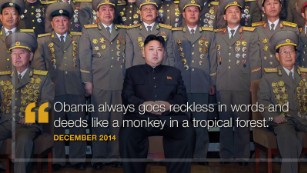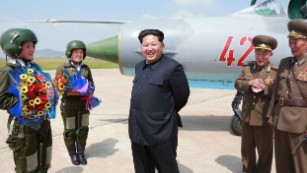Story highlights
- The U.S. calls on North Korea to "refrain from irresponsible provocations"
- Strong doubts remain over whether North Korea has the technology to target the U.S.
- Pyongyang says its main nuclear complex is operating normally
(CNN)In
its latest bout of saber rattling, North Korea says it is ready to use
nuclear weapons against the United States and other foes if they pursue
"their reckless hostile policy" toward Kim Jong Un's regime.
In
a statement carried by the North's state-run Korean Central News Agency
on Tuesday, an atomic energy official said Pyongyang is improving its
nuclear weapons arsenal "in quality and quantity."
"If
the U.S. and other hostile forces persistently seek their reckless
hostile policy towards the DPRK and behave mischievously, the DPRK is
fully ready to cope with them with nuclear weapons any time," the
director of the North Korean Atomic Energy Institute said, using an
abbreviation of the country's official name, the Democratic People's
Republic of Korea.
North Korea's main
nuclear complex at Yongbyon, which includes a uranium enrichment plant
and a plutonium production reactor, is operating normally, the official
told the news agency.
North says weapons are for self-defense
Notorious
for issuing alarming and attention-grabbing statements, Pyongyang has
repeatedly threatened to use nuclear weapons against the United States.
But strong doubts remain over whether it has the missile technology to target the U.S. mainland.
In an indication it wants to advance its missile capabilities, North Korea said Monday
it was planning more satellite launches. Prohibited by U.N. Security
Council resolutions, such launches are widely seen as a way of testing
ballistic missile technology.
Kim's
regime didn't say when the next launch would take place, but observers
have speculated that it could launch a long-range rocket carrying a
satellite in October around the 70th anniversary of North Korea's ruling
party.
The atomic energy official on
Tuesday reiterated the North Korean stance that its nuclear weapons
program is a self-defense measure "in the face of the U.S. extreme
hostile policy and nuclear threats towards it."
U.S. stresses missile defense measures
In
an interview with CNN earlier Tuesday, U.S. Ambassador to South Korea
Mark Lippert said Washington is constantly working with Seoul "to ensure
that other allies in the region as well as the U.S. homeland are
protected from threats posed by North Korea."
"We've
moved, over time, a good deal of missile defense capability to the
region," Lippert said before North Korea issued the statement about its
nuclear program. "Ground-based interceptors to Alaska, surface
combatants to the Western Pacific, a THAAD battery on Guam, another
radar in Japan in order to be ready and vigilant for anything the North
Koreans may or may not do."
THAAD, which stands for Terminal High Altitude Area Defense, is a ballistic missile defense system.
After
the North Korean statement, U.S. State Department spokesman John Kirby
told a regular news briefing that the United States continues "to call
on North Korea to refrain from irresponsible provocations that aggravate
regional tensions, and instead focus on fulfilling its international
obligations and commitments."
Nuclear complex revamped
The North's announcement that the Yongbyon nuclear complex is up and running comes as little surprise.
During
a period of heightened tensions in the region in spring 2013,
Pyongyang announced it would revamp and restart the facilities at the
site.
In February of this year, U.S.
Director of National Intelligence James Clapper said he believed that
"North Korea has followed through on its announcement by expanding its
Yongbyon enrichment facility and restarting the reactor."
But some North Korea watchers have questioned whether the reactor is operating at full power.
A July article on 38 North,
a website that specializes in analysis of North Korea, said satellite
imagery suggested the reactor may not have been operating or was only
functioning at low power levels.
The
report's authors also identified rapid construction at the uranium
enrichment plant of a building they theorized could be used "to assemble
or store conventional high explosive components of a nuclear weapon."
The
North Korean atomic energy official said Tuesday that the Yongbyon
facilities were being employed for both economic development and "the
building of a nuclear force."
Expert says nuclear arsenal is growing
Kim
Jong Un's regime may already have 10 to 15 nuclear weapons, according
to David Albright, a former U.N. weapons inspector who now heads the
nonprofit Institute for Science and International Security.
In a report in February, Albright predicted that Pyongyang could increase its stockpile to anywhere between 20 and roughly 100 nuclear weapons by 2020.
The growing nuclear arsenal poses a serious strategic challenge for the United States.
The
U.S. government has repeatedly called on North Korea to commit to
denuclearization as a condition of any future negotiations, but Kim's
regime has repeatedly dismissed such an idea, demanding to be recognized
as a nuclear power.
Pyongyang's
statement Tuesday provided few details about its specific grievances
with U.S. policy, which it accused of "openly seeking the downfall" of
North Korea's "social system."
The combative rhetoric comes just three weeks after North and South Korea reached a deal to
dial down tensions in the region that were inflamed by landmine blasts
and artillery fire in the Demilitarized Zone that separates the two
countries.
South Korean President Park
Geun-hye issued a joint statement with EU leaders after a summit in
Seoul on Tuesday in which they strongly condemned the North's "continued
development of its nuclear and ballistic missile programs."
The
leaders urged North Korea to abandon all its nuclear weapons and
existing nuclear program in a "complete, verifiable, and irreversible
manner," and to "refrain from any further provocation."



No comments:
Post a Comment